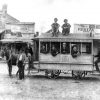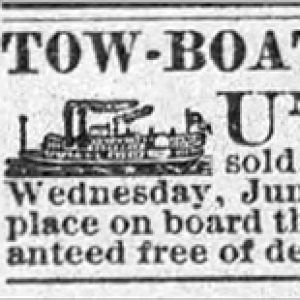calsfoundation@cals.org
Robert Semple [Steamboat]
The Robert Semple was a steam towboat initially used to haul coal from Johnson County. It played a small role in the fighting during the 1874 Brooks-Baxter War.
The Robert Semple was completed in 1873 by James Rees of Pittsburgh, Pennsylvania. The vessel was 126 feet long and twenty-two feet wide and was owned by the Spadra Coal Company. The first reference to it in the Arkansas Gazette concerned a March 3, 1872, event when “quite a number of our best citizens” took an excursion “for the purpose of testing the value of the Spadra coal as a steam-producing fuel.” The coal was mined on the east bank of Spadra Creek in Johnson County about a mile above its mouth. The newspaper wrote that “a number of steamboatmen repaired to the boat some time before the steam was got up, and noted the burning qualities of the coal, and all, without exception, pronounced it a success.”
The vessel, under the command of Captain Jeff Baldwin, was soon regularly hauling coal barges on the Arkansas River. It was towing four barges on February 8, 1874, when it hit the Cairo and Fulton Railroad bridge. The barges were cut loose and set adrift, “putting the Semple to some little trouble but doing no damage.” The next day, the steamer left Little Rock (Pulaski County) heading to New Orleans, Louisiana, “with 20,000 tons of coal—the first that has gone to the market below.”
Supporters of Elisha Baxter used the vessel during the Brooks-Baxter War, and the Gazette reported that on April 22, 1874, “a number of armed men were placed on board the steamer Robert Semple, for the purpose of going down the river to intercept and capture a boat from Pine Bluff said to be coming up with a company of Brooks men.” The foray was canceled when the two sides agreed to a temporary truce.
A Fort Smith (Sebastian County) newspaper reported on May 9 that “there was some trouble at Spadra between some State troops under Colonel Brizzolara and the steamboat Semple.” Brizzolara and eight men had been sent to seize the steamboat on May 6, but its owner, G. A. Meyer, obtained a warrant for their arrest, which was served by “an armed posse, the boat protected, and the would-be takers released.”
On May 12, the Robert Semple, reportedly carrying volunteers for Baxter, landed just above the Baring Cross Bridge, and Brooks’s followers were ordered toward the boat. Soon, “skirmishers were deployed by each side and firing commenced.” Brooks men took up positions in “old rifle pits” by Union Station, while Baxter infantry led by Thomas J. Churchill and William D. Blocher set up positions on 5th, 6th and 7th streets, and Hercules King Cannon White’s cavalry occupied the high ground around the state penitentiary and deaf-mute asylum. For two or three hours, “the firing…was very heavy, rendering it unsafe for pedestrians and frightening families, whose houses were struck with bullets.” U.S. troops double-timed from Broadway to break up a final skirmish at the corner of Second and Spring streets, but it had ended when they arrived, as had the day’s combat. Ten men were wounded in the day’s skirmishing.
As tensions eased after President Ulysses S. Grant signaled his support of Baxter’s claim to Arkansas’s governorship on May 15, 1874, the Semple and the Danville, which had been used by Joseph Brooks’s troops, were reportedly “laid up at the railroad landing.” As part of the peace agreement between the Brooks and Baxter factions, the Robert Semple on May 16 transported eighty-eight Brooks supporters to Fort Smith “under a white flag,” an expedition the Gazette derisively reported by saying “the Robert Semple will probably take a tow of livestock up the river.”
On June 12, the Robert Semple, which the Gazette described as “our local packet between here and Pine Bluff,” transported Baxter and a group of his followers to Pine Bluff (Jefferson County) for a celebration of his victory. The paper reported that “the barbecue was a grand affair. Three thousand people were present. Gov. Baxter’s address was received with tremendous applause, and the vast concourse seemed to be carried away with happiness.” Hercules White and Robert C. Newton also made speeches at the event.
In April 1875, the steamer was again demonstrating the Spadra Coal Company’s product at St. Louis, Missouri, where “competent judges pronounced one ton of it to be equal to two tons of the best Pittsburgh coal.”
The steamboat went through several owners before being purchased in New Orleans by Captain R. G. Wheeler for the fleet of Durant, Wheeler and Company, “the boss raft boatmen of Stillwater [Minnesota]” in 1877, at which time a newspaper reported, “The Semple looks rather dilapidated, but some light repairing and couple of coats of paint will remedy that.” The vessel hauled log rafts for a couple of years before the company decided to build a new raft tug for which “machinery will be taken out of the Robert Semple, which boat will be dismantled” in 1879.
For additional information:
“After the Battle” Southern Standard, April 25, 1874, p. 2.
“Arkansas Coal.” Arkansas Gazette, March 5, 1872, p. 4.
“Coal Consumption.” St. Louis [Missouri] Globe-Democrat, April 24, 1875, p. 3
“Gazette Lines.” Arkansas Gazette, February 10, 1874, p. 4.
Harrell, John M. The Brooks and Baxter War: A History of the Reconstruction Period in Arkansas. St. Louis, MO: Slawson Printing, 1893. Online at https://archive.org/details/brooksbaxterwarh00harr/page/n3/mode/2up (accessed October 31, 2024).
“Pine Bluff.” Arkansas Gazette, June 13, 1874, p. 1.
“Pine Bluff.” Arkansas Gazette, June 14, 1874, p. 1.
“Raft Items.” St. Louis Globe-Democrat, April 7, 1877, p. 7.
“River News.” Arkansas Gazette, June 13, 1874, p. 4.
“River News.” Arkansas Gazette, May 15, 1874, p. 4.
“River News.” Arkansas Gazette, May 16, 1874, p. 1.
“River News.” Arkansas Gazette, May 17, 1874, p. 4.
“River Rumblings.” St. Paul [Minnesota] Daily Globe, April 10, 1879, p. 4.
“Steamboat for Sale” [Advertisement], St. Louis [Missouri] Republican, August 10, 1875, p. 5.
Mark K. Christ
Central Arkansas Library System







Comments
No comments on this entry yet.